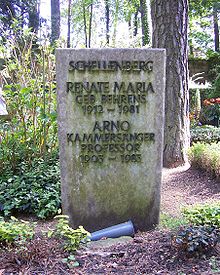Arno Schellenberg
Arno Schellenberg (born November 16, 1903 in Berlin , † March 20, 1983 in Dresden ) was a German opera singer (lyrical baritone ) and vocal teacher.
Life
Arno Schellenberg began his vocal studies in 1926 at the Academy of Music in Berlin-Charlottenburg. During his studies, for example, he appeared in Heinrich Marschner's Hans Heiling in 1928 as Hans Heiling. Julius von Raatz-Brockmann (1870–1944) was one of his teachers . Schellenberg made his debut as a singer in 1929 at the Düsseldorf Opera House . From 1930 to 1931 he followed an engagement at the Cologne Opera . From 1931 to 1932 he appeared as the first baritone at the Königsberg Opera House before he was hired by Fritz Busch to the Saxon State Opera in Dresden in 1932 . In the 1930s he was the youngest singer in Germany to be awarded the title of chamber singer , and in the following years he rose to become one of the leading singers at the Dresden Semperoper. After the end of the Second World War he was one of the artists who played a key role in the rebuilding of Dresden's musical life. At the first Dresden opera after the war - Wolfgang Amadeus Mozart's Figaro's wedding on August 10, 1945 under the musical direction of Joseph Keilberth in the Tonhalle (now the Kleines Haus ) on Glacisstrasse - Schellenberg took on the role of Count Almaviva. He stayed at the Semperoper until 1949, but also performed abroad, for example in Italy and Austria. His colleagues included Elfride Trötschel , Theo Adam and Rudolf Schock .
In 1950, Schellenberg belonged to Hanns Eisler and Rudolf Wagner-Régeny as a member of the first professors' group at the Hanns Eisler School of Music in Berlin , where he taught singing. In 1966 Schellenberg finished his singing career and received a professorship at the Carl Maria von Weber Academy of Music in Dresden . Reiner Goldberg and Hans-Joachim Ketelsen were among his students . In 1968 the Saxon State Opera made him an honorary member.
Arno Schellenberg died in Dresden in 1983. His grave is in the Weißer Hirsch forest cemetery . After 1945, Schellenberg lived in the Weißer Hirsch district of Dresden at Bautzner Landstrasse 46 in the Villa Turmeck, which was built around 1900. The house was originally owned by the Behrens family, whose daughter Renate (1912–1981), an opera singer, married Schellenberg. After Schellenberg's death, the house was still inhabited for a short time and had been vacant since the early 1990s. In 2014 the villa was renovated and is now used as an apartment building.
In 1999 a street in Dresden- Nickern was named Arno-Schellenberg-Straße.
Appearances
Schellenberg appeared as an opera singer, but has also given recitals regularly since the 1930s. He worked with Richard Strauss , among others , and interpreted works by Carl Loewe and Robert Schumann . Some of his appearances have been released on phonograms. He was valued by contemporaries for his intense acting.
Roles (selection)
- Gioachino Rossini - The Barber of Seville (1937), role: Figaro
- Richard Wagner - The Mastersingers of Nuremberg (1938), role: Kothner
- Carl Maria von Weber - Der Freischütz (1944), role: Ottokar
- Wolfgang Amadeus Mozart - The Marriage of Figaro (1945), role: Count Almaviva
- Albert Lortzing - The Armourer (1946), role: Count von Liebenau
- Albert Lortzing - Der Wildschütz (1948), role: Count von Ebersbach
- Wolfgang Amadeus Mozart - The Magic Flute (1949), role: Papageno
- Richard Strauss - Der Rosenkavalier , role: Herr von Faninal
- Richard Strauss - The love of Danae , role: Jupiter
- Giuseppe Verdi - Falstaff , role: Ford
- Richard Strauss - Daphne , role: Adrast (1st shepherd)
- Daniel-François-Esprit Auber - Fra Diavolo , role: Lord Kookburn, a traveling Englishman
- Gaetano Donizetti - Don Pasquale , role: Dr. Malatesta
broadcast
- Visiting Arno Schellenberg : Portrait, February 28, 1966
literature
- Karl-Josef Kutsch , Leo Riemens (Ed.): Immortal Voices. Singer lexicon . 2nd edition Francke, Munich 1982, ISBN 3-7720-1555-7 , p. 622 (EA Munich 1975).
- Folke Stimmel, Reinhardt Eigenwill et al .: Stadtlexikon Dresden . 2nd edition Verlag der Kunst, Dresden 1998, p. 367, ISBN 3-364-00304-1 (EA Dresden 1994).
Web links
Individual evidence
- ↑ Pierre Van Rensselaer (Ed.): Pierre Key's Music Year Book . Pierre Key, New York 1928, p. 58.
- ↑ See Hans Hotter : Memoirs . Northeastern, Lebanon 2006, p. 80 (= Hans Hotter: May was weighed me . Kindler, Munich 1996).
| personal data | |
|---|---|
| SURNAME | Schellenberg, Arno |
| BRIEF DESCRIPTION | German opera singer (lyric baritone) and vocal teacher |
| DATE OF BIRTH | November 16, 1903 |
| PLACE OF BIRTH | Berlin |
| DATE OF DEATH | March 20, 1983 |
| Place of death | Dresden |


